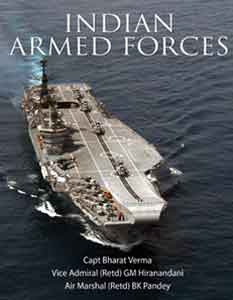Indo-Pak Confrontation
On the western front, the status of Jammu and Kashmir, truly the only cause of conflict, is a legacy of the colonial past. In the wake of super-power rivalry, Britain was replaced in the region by the USA, and while Pakistan was drawn quite readily in to the American camp, India adopted a philosophy of non alignment opting for a diverse inventory of military equipment i.e. British and French. However for strategic, economic and political reasons India had to subsequently lean heavily on the Soviet Union for military hardware to meet with the demands of national security. Even though formally not allied with the USSR, India was seen by the USA as being squarely in the Soviet camp and was treated with extreme suspicion and unconcealed disdain.
“¦there are other factors and deep seated ant-India sentiments that militate against normalization of relations. In the Pakistani mindset, India is a hegemonic power that poses a constant and potent threat to her very survival.
Nearly six decades and four major conflicts later, there appears to have been some qualitative change in the equation between India and Pakistan. People to people contact, exchange programmes in a variety of fields, restoration of rail and road transport, liberalization of visa regimes, trade both official and unofficial and cooperation in the wake of the disastrous earthquake in the recent past have rekindled hopes for peace between the two adversaries. The media has also by and large played a very constructive role in exposing the reality of India to the several brainwashed and misled generations of Pakistanis. All these developments have served to weaken the anti-each-other platforms that the political establishment on both sides have so far thrived upon.
However, there are other factors and deep seated ant-India sentiments that militate against normalization of relations. In the Pakistani mindset, India is a hegemonic power that poses a constant and potent threat to her very survival. The corporate aim of the Pakistani establishment has been to exploit the vulnerabilities of India, weaken her from the inside and ‘to bleed her with a thousand cuts’. The situation with regard to the status of Kashmir has not changed, and like a persistent virus, resurfaces with irritating regularity, seemingly frustrating efforts at forward movement.
 In spite of all noble intentions, it appears difficult if not impossible for the Pakistani establishment to retreat from or significantly alter their long held position vis-à-vis Kashmir as it would amount to political suicide for the leadership whether military or civilian. As for the Indian view, it is only for Pakistan to demonstrate flexibility which the leadership is not prepared to do. And then there is the unfinished business of POK. Also, as it appears, the maximum that India can concede on Kashmir is less than what would be acceptable to Pakistan.In view of the inflexible position on both sides, Kashmir will continue to be a major impediment in any effort at securing the western borders from the possibility of conflict. Nothing short of reversing the process of partition leading to the reunification of India and Pakistan can help resolve the dispute over Kashmir. Solution to the Kashmir problem will therefore remain as much in the realm of fantasy in the foreseeable future as the suggestion to reunite the two nations.
In spite of all noble intentions, it appears difficult if not impossible for the Pakistani establishment to retreat from or significantly alter their long held position vis-à-vis Kashmir as it would amount to political suicide for the leadership whether military or civilian. As for the Indian view, it is only for Pakistan to demonstrate flexibility which the leadership is not prepared to do. And then there is the unfinished business of POK. Also, as it appears, the maximum that India can concede on Kashmir is less than what would be acceptable to Pakistan.In view of the inflexible position on both sides, Kashmir will continue to be a major impediment in any effort at securing the western borders from the possibility of conflict. Nothing short of reversing the process of partition leading to the reunification of India and Pakistan can help resolve the dispute over Kashmir. Solution to the Kashmir problem will therefore remain as much in the realm of fantasy in the foreseeable future as the suggestion to reunite the two nations.
In the emerging scenario and the rapprochement with the USA, India could well be drawn in to a US led security arrangement for a new power balance in the region.
Apart from the Kashmir issue, there are problems on other fronts as well. The population of Pakistan is growing at roughly 2.6% annually and is not matched by its economic growth. Pakistan will therefore continue to be in a dysfunctional state and would have to depend heavily on foreign assistance for survival. The growing economic disparity between India and Pakistan could aggravate the sense of insecurity that a small nation perceives from a bigger and more prosperous and powerful neighbour with whom there are deep ideological differences and a long history of turbulent relationship. The sense of insecurity may be further aggravated if our western neighbour finds her position vis-à-vis Kashmir weakening. Under such circumstances, for Pakistan, a conflict may appear to be an inevitable and desperate option. Under the shadow of the nuclear threat, in all likelihood, Pakistan may avoid an all out war and prefer to sustain low intensity conflict in the valley and undermine our interests through covert support to insurgency in other parts of the country bordering Nepal and Bangladesh. This certainly would be a more convenient and cost effective option for Pakistan.
Prospects of Peace
It should be clear from the preceding that India cannot rest on its oars and take permanent peace in the subcontinent for granted. Perhaps peace can only be ensured if one is well prepared to meet with any conceivable threat to national security by all the means at its disposal, be it political, economic, diplomatic, or military. Encouraging progress in efforts at settlement of disputes with both China and Pakistan ought not to be assumed as good enough reason for scaling down military capability.
Under the shadow of the nuclear threat, in all likelihood, Pakistan may avoid an all out war and prefer to sustain low intensity conflict in the valley and undermine our interests through covert support to insurgency in other parts of the country bordering Nepal and Bangladesh.
Besides, in future conflicts with either or simultaneously with both the neighbours, India needs to be prepared to manage conflicts at the conventional level as also fight and survive in a nuclear environment. In the ultimate analysis, a nation is respected for its strength, political, economic and military.
India as a Regional Power
The last decade of the 20th century witnessed a set of three major events that had a profound effect on the destiny of many nations as also on that of India. The first of these was the collapse of the Soviet Union which seemed to have severed India’s moorings to set it a drift for a while. The second major event was the uncaging of the Indian economy and the process of economic reforms and liberalization that thrust India on to the global scene. The third and most significant event was the explicit assertion in 1998 of the nuclear status by both India and Pakistan. Thus in the new century, the situation for the nation and her armed forces is qualitatively different in a number of ways.
In the emerging scenario and the rapprochement with the USA, India could well be drawn in to a US led security arrangement for a new power balance in the region. The USA regards India as one of the power centres that can exercise a stabilizing influence in the region and can be relied upon. High levels of investment notwithstanding, containment of China will remain a major concern for the USA. In her own perspective, on account of India’s energy security needs, so vital for sustained economic growth, India’s zone of interest transcend her geographical boundaries extending from South East Asia to the Central Asian Republics and the Gulf. India conveyed to the world a subtle message by of her swift response to the Tsunami in December 2004. In the evolving geopolitical situation and economic growth sustained at 8%, conditions are favourable for India to assume the role of a regional power in not too distant a future.
Rhetoric, assurances and promises must not lull the nation in to complacency and risk a replay of the 1962 debacle.
India would be expected to shoulder higher levels of military responsibility consequent to her evolving regional power status. In addition, the fundamental reasons for conflict with China and Pakistan continue to linger vigorous political and diplomatic efforts notwithstanding. The search for solutions to disputes rooted deeply in history require prolonged and complex negotiations. However to be successful on the political and diplomatic fronts, one needs to negotiate from a position of strength. India is well on the way to becoming an economic power. It is incumbent on the leadership to ensure that there is no dilution of military capability if the equation with our traditionally hostile neighbours is not to be compromised. Rhetoric, assurances and promises must not lull the nation in to complacency and risk a replay of the 1962 debacle.




